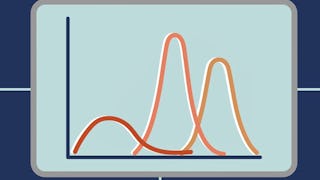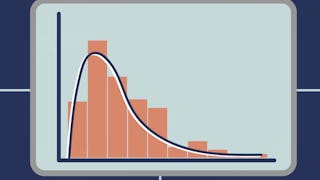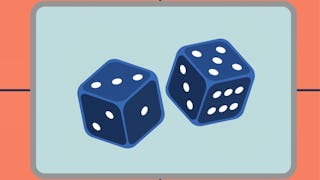本课程介绍了贝叶斯统计学,其中关于参数或假设的推断会随着证据的积累而更新。您将学习使用贝叶斯法则将先验概率转换为后验概率,并了解贝叶斯范式的基本理论和观点。课程将把贝叶斯方法应用到几个实际问题中,展示端到端的贝叶斯分析,从提出问题到建立模型,再到获取先验概率,最后在 R(免费统计软件)中实现最终的后验分布。此外,课程还将介绍可信区域、贝叶斯均值和比例比较、贝叶斯回归和使用多重模型的推理,以及贝叶斯预测的讨论。 我们假定本课程的学习者已具备与本专业前三门课程相同的背景知识:"概率与数据导论"、"推断统计 "和 "线性回归与建模"。
了解顶级公司的员工如何掌握热门技能

积累特定领域的专业知识
- 向行业专家学习新概念
- 获得对主题或工具的基础理解
- 通过实践项目培养工作相关技能
- 获得可共享的职业证书

该课程共有7个模块
本简短模块将介绍有关 Coursera 专业和课程、本专业的基本知识:使用 R 的统计学,以及本课程:贝叶斯统计。请花几分钟时间阅读这些信息。感谢您加入我们的课程!
涵盖的内容
1个视频5篇阅读材料1个讨论话题
<p>欢迎!在接下来的几周里,我们将一起探索贝叶斯统计。<p>在本模块中,我们将学习条件概率,即给定事件 A 的事件 B 的概率。条件概率在医疗决策中非常重要。到本周结束时,您将能够使用贝叶斯法则解决问题,并更新先验概率。</p><p>请使用学习目标和练习测验来帮助您学习贝叶斯法则,并应用您在实验室和测验中学到的知识。
涵盖的内容
9个视频4篇阅读材料3个作业
本周,我们将讨论贝叶斯法则的连续版本,向您展示如何在共轭族中使用该法则,并讨论可信区间。本周结束时,您将能够理解和定义先验概率、似然率和后验概率的概念,并确定它们之间的关系。
涵盖的内容
10个视频3篇阅读材料3个作业
在本模块中,我们将讨论贝叶斯决策、假设检验和贝叶斯检验。本周结束时,你将能够根据贝叶斯统计做出最优决策,并使用贝叶斯因子比较多个假设。
涵盖的内容
14个视频3篇阅读材料3个作业
本周,我们将学习贝叶斯线性回归和模型平均法,它允许您使用多个模型进行推断和预测。本周结束时,您将能够实施贝叶斯模型平均法,解释贝叶斯多元线性回归,并理解它与频数线性回归方法的关系。
涵盖的内容
11个视频3篇阅读材料3个作业
本周内容包括采访统计学家,了解他们如何在工作中使用贝叶斯统计法,以及课程的最终项目。
涵盖的内容
3个视频1篇阅读材料
在本模块中,您将使用所提供的数据集完成一个数据分析问题并提交报告。请阅读背景信息,查看报告模板(从 "课程项目信息 "中的链接下载),然后完成同行评议作业。
涵盖的内容
2篇阅读材料1次同伴评审
获得职业证书
将此证书添加到您的 LinkedIn 个人资料、简历或履历中。在社交媒体和绩效考核中分享。
位教师



从 数据分析 浏览更多内容
 状态:免费试用
状态:免费试用University of California, Santa Cruz
 状态:免费试用
状态:免费试用University of California, Santa Cruz
 状态:免费试用
状态:免费试用Illinois Tech
 状态:免费试用
状态:免费试用University of California, Santa Cruz
人们为什么选择 Coursera 来帮助自己实现职业发展




学生评论
798 条评论
- 5 stars
45.23%
- 4 stars
20.42%
- 3 stars
14.53%
- 2 stars
9.27%
- 1 star
10.52%
显示 3/798 个
已于 Aug 24, 2017审阅
An interesting and challenging course, would be better with more real examples and explanation as some of the material felt rushed
已于 Oct 31, 2016审阅
Very good introduction to Bayesian Statistics. Very interactive with Labs in Rmarkdown. Definitely requires thinking and a good math/analytic background is helpful.
已于 Sep 20, 2017审阅
Great course. Difficult to apprehend sometimes as the Frequentist paradigm is learned first but once you get it, it is really amazing to see the believe update in action with data.
常见问题
我们假定您已经掌握了与本专业课程相同的知识。
完成 Coursera 课程不能获得杜克大学的学分;因此,杜克大学无法为您提供大学成绩单。不过,您的电子证书将被添加到您的成就页面--在那里,您可以打印证书或将其添加到您的 LinkedIn 个人资料中。
要获取课程资料、作业和证书,您需要在注册课程时购买证书体验。 您可以尝试免费试听,或申请资助。课程可能提供 "完整课程,无证书"。通过该选项,您可以查看所有课程资料,提交必要的评估,并获得最终成绩。这也意味着您无法购买证书体验。
更多问题
提供助学金,







